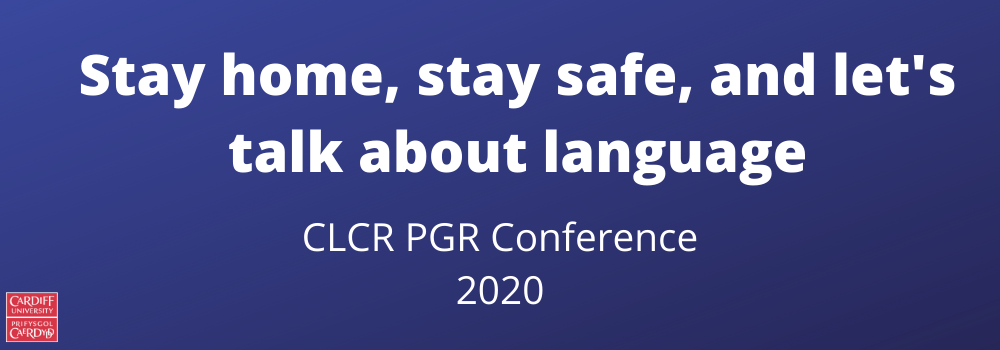CLCR PGR Conference 2020

The 2020 CLCR Conference is taking a new format due to the Covid-19 pandemic. We understand that, even though times are difficult, it is important for researchers to be able to talk about their research and get some feedback. So, this year CLCR Postgraduate Researchers have made posters about some aspect of their research. They also added two questions they have had or challenges they have faced in order to interact with the conference participants. From 15th to 17th June, all CLCR students and staff are welcome to come, read the posters, and, most importantly, leave their comments.
See you then!
Organisation team: Debora Cabral (cabrallimad@cardiff.ac.uk), Lucy Chrispin (chrispinl@cardiff.ac.uk) and Aurora Goodwin (goodwina3@cardiff.ac.uk)
Posters
Forensic and Institutional Discourse (A)
Narrative Structure and Identity Representation in Manosphere Blog Posts – Kate Barber
A Methodological Approach to a Discursive Analysis of Judicial Activism – Débora Cabral
The Use of Legal Terminology in Sovereign Citizen Pseudolegal Texts – David Griffin
Victim Voices: Analysing Child Discourse in Online Sexual Grooming Interactions – Ruth Mullineux-Morgan
Forensic and Institutional Discourse (B)
The Language Of Student Complaints Procedures In The UK Higher Education Sector – Developing the Data and Methodology Chapter – Lisa Pomfrett
Virtual Responsibility in Criminal Narratives – Emily Powell
Question Types and Constraint in Police-Victim Interaction: A case study – Kate Steel
Grammatical theory
An Empirical Investigation into the Nature and Degree of Nominality – Alex Carr
A Contrastive Study into the Lexico-grammatical Reactances of Two Intransitive Verbal Categories – Lucy Chrispin
Morphological Regularities and Patterns in English Word Formation – Kateryna Krykoniuk
Automatic Grammar Induction from Free Text Using Insights from Cognitive Grammar – Vigneshwaran Muralidaran
Language and Media
The Role of Digital Multilingual Patterns & Functions on Branding and Self-Branding: An investigation of practices by Saudi users on Twitter – Reem Al Madani
Positive and Negative evaluative Language: A comparative study on British News Reports of the ISIS Conflict in Iraq and Syria using Appraisal Theory – Zeen Al-Rasheed
Global Bilingual News: Same events, but variable perspectives – Banan Assiri
Keepin’ it real: Styling authenticity on Twitter disinformation accounts – Aurora Goodwin
Identity performance of older Greek-Cypriot Facebook users: Communicative Functions Analysis – Stephanie Tilliridou
Language Learning and Teaching
A Cross-linguistic Study of Metadiscourse Markers in English Academic Writing of Saudi EFL Students and UK Native Speakers of English – Nasser Alqahtani
Multimodality
Images of Hate: A Methodology for Analysing Visual Extremism – Keighley Perkins
Identification and Analysis of Visual Irony in Political Cartoons of the Algerian Civil War (1992-2002) – Sabrina Toumi
Phonetics, Phonology and Speech Production
Lexical Access in Bilingual Speech Production “the hard problem”: Evidence from Masked Priming of Picture Naming – Manal Alharbi
The Non-arbitrariness of the Emotive Hijazi Non-Lexical Expressions – Mashael Assaadi
Determining the Impact of Syntactic Intelligibility on the Recognition of the Emotional Speech Signal – Matthew Coombes
The vocalic inventory of late Old Northumbrian – Elisa Ramírez Pérez
Sociolinguistics and Discourse Analysis
The Acquisition of Sociolinguistic Competence in a Welsh Immersion Context – Katharine Young
What’s So Special About The Circus? (And Who Says So) – Katharine Kavanagh